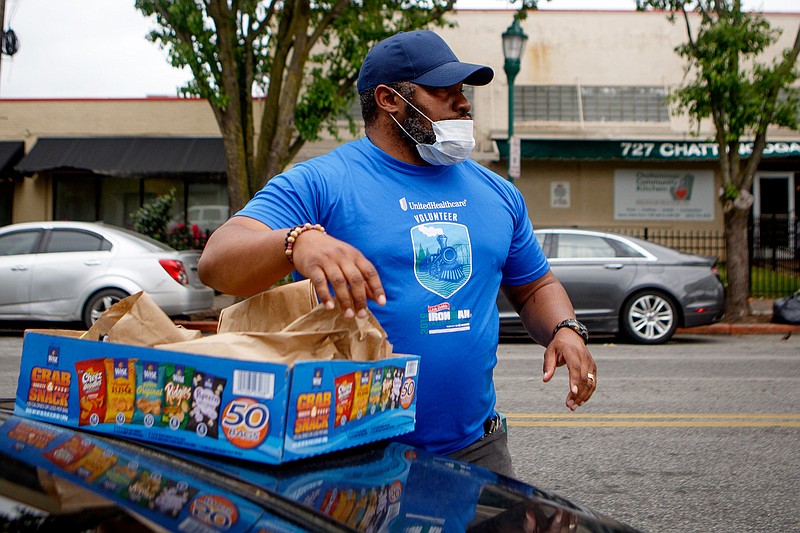I know you feel afraid.
I do, too.
Everyone does.
Fear hurts. It's not like love, which opens and embraces. Fear tightens, constricts and hardens, the spirit's form of arteriosclerosis. When I feel afraid, my abdomen and chest feel like they're being squished and squeezed into a too-small box.
Will we get sick? What will school be like? How long will this go on?
Think of John Lewis, who died Friday. Think of the things he must have feared. Yes, we will memorialize him as a founding father of a more righteous and just nation, but at some point, he was your age, too. Fear must have been a constant in his life. In his 20s. His 40s. Marching in Selma. Desegregating Nashville. How many times was he beaten, cursed and arrested?
Yet fear never won.
Fear was never the mountaintop.
Science tells us fear is evolutionary; common sense says it serves a good purpose. It keeps us alive.
It's also illogical. People used to fear comets. Women riding bicycles. Little Richard. Twisted Sister.
Factually, this is the best time to be alive. We have less to fear than ever.
But it doesn't feel that way, does it?
All around you, people are adapting, coping, falling and getting back up. Nobody's done a pandemic before. It's a 100-year flood.
The little walls of security we leaned on - routine, classes, sports, parties - aren't there.
"COVID is part of our world now," one doctor told me. "It isn't going anywhere."
How can we make peace with this?
How can we be less afraid?
Lately, a good friend explained her family's coronavirus motto:
"We refuse to live in fear," she said.
She didn't say: we refuse to be afraid.
She didn't say: we pretend to be invincible.
She said this: we refuse to let fear win. We refuse to be controlled by it. We refuse to pack up and move our belongings - behaviors, attitudes, responses - in the House That Fear Built.
How do you and I do this, too?
It's funny. The longer I live, the more vulnerable I become.
Everything I love and cherish? Eventually, I will lose it all. I didn't understand that at 35. Sure as hell not at 21.
Things fall apart, whether we admit it or not. Our houses don't stand. We want them made of forever brick, but really, it's just straw. Here come the wolves. Huff and puff.
Will they blow our house down?
Will it hold true?
Here's the irony: to ignore it - the wolves, the straw, the vulnerability - is to stay afraid of it.
Looking at it, shaking hands with it, building a relationship with fear - that's how you overcome it.
"Being vulnerable," another friend said.
He made a list of all his vulnerable places:
Home.
Kids.
Job.
Marriage.
His own mortality.
Faith.
"You name it," he said. "I have spent days worrying about it."
It is truth like that - damn, I really can't control much of anything - that sets us free.
Look closely at your mind. Fear is the one with the big mouth. The loudest talker in the room. So much hot air.
Over in the corner, sipping her tea quietly, sits Wisdom.
And Resiliency.
And Knowing.
"I can know things down at this level that I can't on the chaotic surface," writes Glennon Doyle in her bestseller "Untamed." " Knowing is beyond and beneath language."
It is life in the deep end, not the shallows.
Remember Troy Rogers and Tony Oliver? They've served more than 15,000 meals to folks since this began.
Sure, they're afraid, but instead of tightening up, they opened up. Instead of isolating, they went toward others.
I will never forget that.
The other night, when you were upset, your mom told you a story:
She was teaching swimming lessons. You were helping her.
Remember those little boys? They were afraid to put their faces in the water. Afraid to let go of the side of the pool.
You and Mom kept reminding them: we'll catch you.
Swim to us.
We'll be there.
"It's OK," you told them. "You can let go. We'll catch you."
Those boys? They were white-knuckling that pool deck. They weren't letting go. Fear - constricting, gripping, tightening - had them.
But you knew better, didn't you?
You knew they would be fine.
You knew.
You knew.
Jesus said we have to lose our lives to find them. We may not have nine lives, but it appears we have two:
The lives we clutch and cling to. Our shallow-end lives.
And the lives we open to and surrender with. Our deep-end lives. Our John Lewis lives.
"What you fear will not go away," the poet William Stafford wrote. "It will take you into yourself and bless you and keep you. That's the world, and we all live there."
Fear, like this novel coronavirus, is our teacher.
It teaches us what we cling to. It shows us the pool's edge.
And the things we cling to will ultimately undo and drown us.
Fear shows us the deep end by putting us in the shallows.
Want to find your life? Lose it.
Want to be less afraid? Then get to know fear.
That's the blessing.
Because then you'll know:
When.
To.
Let.
Go.
David Cook writes a Sunday column and can be reached at dcook@timesfreepress.com.

